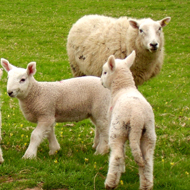
Advice issued by chief medical officer of Scotland
The chief medical officer in Scotland, Sir Harry Burns has issued advice reminding pregnant women to avoid close contact with animals that are giving birth.
Close contact with sheep during lambing and other farm animals such as cattle and goats, could expose pregnant women and their unborn child to infections carried by the animals.
“Although the number of human pregnancies affected by contact with an infected animal is extremely small, it is important that pregnant women are aware of the potential risks and take appropriate precautions," Dr Burns said.
“These risks are not only associated with sheep, nor confined only to the spring (when the majority of lambs are born). Cattle and goats that have recently given birth can also carry similar infections.”
“Pregnant women should seek immediate medical advice if they experience fever or influenza-like symptoms, or if they are concerned that they could have acquired infection from a farm environment.”
To avoid the possible risk of infection, pregnant women should avoid helping lamb or milk ewes, or helping a cow that is calving or a goat that is kidding.
They should also avoid new-born or aborted lambs, calves, kids, afterbirth or birthing fluids, or contaminated materials such as bedding, or unwashed clothing or boots.
Farmers are also reminded that they have a responsibility to minimise the risks to pregnant women, including members of their family, the public and professional staff visiting farms.



 The latest
The latest